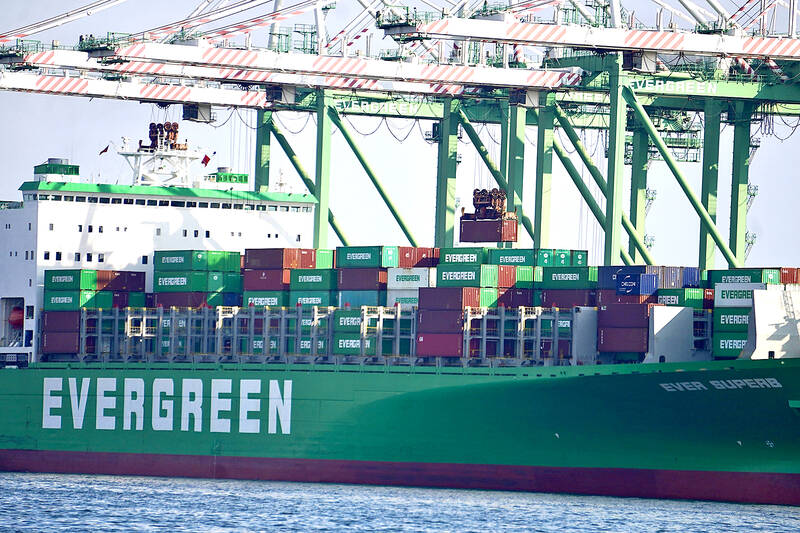Export orders expanded by 10.8 percent annually last month, the highest year-on-year growth in two years, thanks to robust demand for chips used in artificial intelligence (AI) and high-performance computing (HPC) devices mainly from Nvidia Corp, the Ministry of Economic Affairs said yesterday. It also outpaced the ministry’s upper estimate of 5.88 percent annual growth.
Export orders rose from US$42.49 billion in April last year to US$47.1 billion last month, while export orders dropped by 0.1 percent from US$47.16 billion on a monthly basis, the ministry said.
The ministry said it expects the growth momentum to carry into this month and export orders to rise between 1.8 percent and 6.2 percent annually to between US$46.5 billion and US$48.5 billion, as AI chip demand remains vigorous.

Photo: CNA
“April’s stronger performance and the growth prospects for May gave us higher confidence that export orders in the second quarter would return to growth on an annual basis, as compared with our initial estimate at the beginning of this year,” Department of Statistics Director Huang Yu-ling (黃于玲) said via telephone.
Electronic products orders soared by 22.7 percent year-on-year to US$17.1 billion last month, primarily fueled by robust demand for foundry services, chip distribution and printed circuit boards for AI-related applications and HPC devices, the ministry said. Orders from the US grew at the fastest pace of 35.8 percent.
Orders for information and communications technology products last month rose 8.4 percent annually to US$13.05 billion, backed by increased server orders on resilient demand for AI applications and cloud-based devices. Orders from Malaysia grew the highest at 53.3 percent, as manufacturers shifted production from China to the Southeast Asian country amid the US-China technology dispute.
Optoelectronics products orders expanded 13.5 percent annually to US$1.66 billion last month, attributable to increases in orders for TV panels and optoelectronic cameras. TV panel prices have also seen sustained high levels.
The price of 65-inch TV panels is to climb 1.1 percent month-on-month, or US$2 per unit, this month, extending price hikes over the past few months, market researcher TrendForce Corp (集邦科技) said yesterday.
Three major traditional sectors returned to growth last month, driven by more marked restocking demand.
Orders for basic metals, mainly for steel, rose by 3.5 percent year-on-year to US$2.23 billion last month mainly due to restocking demand, the ministry said.
Plastics product orders increased 4.2 percent annually to US$1.61 billion on inventory buildup demand, the ministry said, adding that prices were supported by higher raw material prices.
Petrochemical products orders rose by 8 percent year-on-year last month to US$1.54 billion, as OPEC increased global crude oil prices by 5.9 percent year-on-year, the ministry said.
Machinery orders shrank 3.4 percent year-on-year to US$1.59 billion last month, because increases in equipment spending from semiconductor companies were still not enough to offset the broader weakness in capacity expansion amid a slow global economic recovery, the ministry said.

Application-specific integrated circuit designer Faraday Technology Corp (智原) yesterday said that although revenue this quarter would decline 30 percent from last quarter, it retained its full-year forecast of revenue growth of 100 percent. The company attributed the quarterly drop to a slowdown in customers’ production of chips using Faraday’s advanced packaging technology. The company is still confident about its revenue growth this year, given its strong “design-win” — or the projects it won to help customers design their chips, Faraday president Steve Wang (王國雍) told an online earnings conference. “The design-win this year is better than we expected. We believe we will win

Intel Corp chief executive officer Lip-Bu Tan (陳立武) is expected to meet with Taiwanese suppliers next month in conjunction with the opening of the Computex Taipei trade show, supply chain sources said on Monday. The visit, the first for Tan to Taiwan since assuming his new post last month, would be aimed at enhancing Intel’s ties with suppliers in Taiwan as he attempts to help turn around the struggling US chipmaker, the sources said. Tan is to hold a banquet to celebrate Intel’s 40-year presence in Taiwan before Computex opens on May 20 and invite dozens of Taiwanese suppliers to exchange views

Chizuko Kimura has become the first female sushi chef in the world to win a Michelin star, fulfilling a promise she made to her dying husband to continue his legacy. The 54-year-old Japanese chef regained the Michelin star her late husband, Shunei Kimura, won three years ago for their Sushi Shunei restaurant in Paris. For Shunei Kimura, the star was a dream come true. However, the joy was short-lived. He died from cancer just three months later in June 2022. He was 65. The following year, the restaurant in the heart of Montmartre lost its star rating. Chizuko Kimura insisted that the new star is still down

While China’s leaders use their economic and political might to fight US President Donald Trump’s trade war “to the end,” its army of social media soldiers are embarking on a more humorous campaign online. Trump’s tariff blitz has seen Washington and Beijing impose eye-watering duties on imports from the other, fanning a standoff between the economic superpowers that has sparked global recession fears and sent markets into a tailspin. Trump says his policy is a response to years of being “ripped off” by other countries and aims to bring manufacturing to the US, forcing companies to employ US workers. However, China’s online warriors